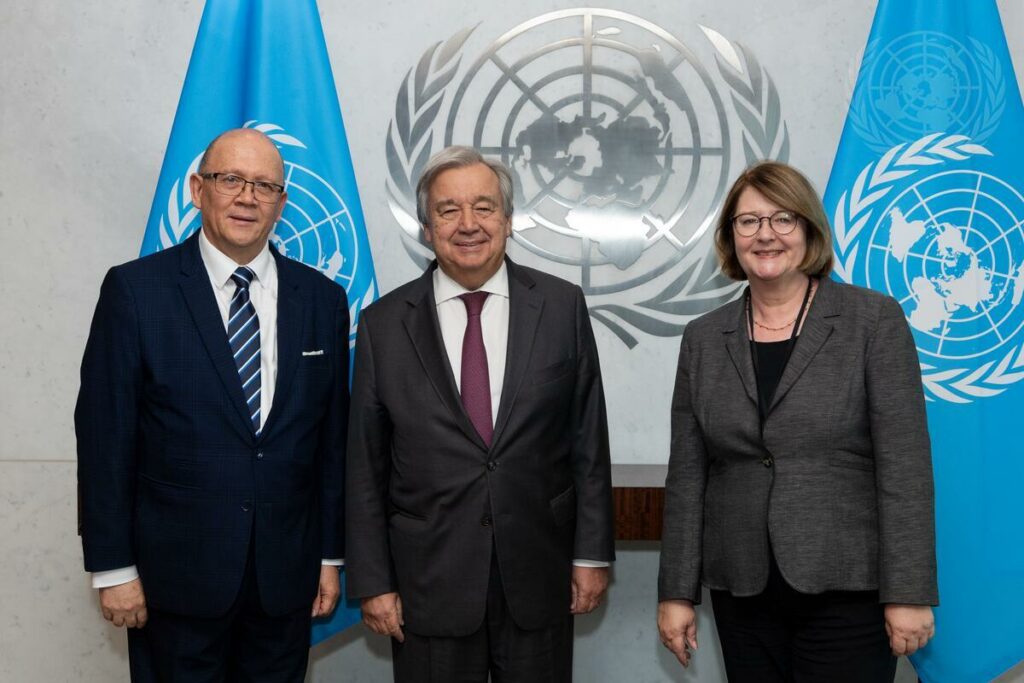Share Twitter Facebook Email Copy URL
On Tuesday 21 November 2023, Equipop organised a conference in Geneva on the theme “Fighting the backlash: Promoting sexual and reproductive rights and health in multilateral spaces” in partnership with the Rosa Luxemburg Foundation and Sexual Rights Initiative. The event welcomed around a hundred participants online and in person, demonstrating a strong interest in the issue. Panellists from diverse backgrounds led discussions to identify avenues of action, notably through creating multi-stakeholder alliances to counter the backlash in all its forms and within all multilateral bodies.
On the approach of the 75th anniversary of the Universal Declaration of Human Rights, Equipop, the Rosa Luxemburg Foundation (Geneva office) and SRI organised a conference in Geneva. The aim was to analyse the dynamics of the backlash against human rights around the world, and strengthen alliances and collective strategies in the face of this phenomenon. The conference was also part of Countdown 2030 Europe’s #AWorldWhere campaign.
Holding the conference in Geneva was particularly strategic: the Palais des Nations and Human Rights Council are spaces where the international community works to advance human rights standards. But Geneva is also a hotbed of rallying among anti-rights movements. It is the city where the “Geneva Consensus Declaration” was adopted in 2020*, marking a major step in the anti-rights offensive. Another event of this kind took place at the UN in New York a few days before the conference. Positioned against the right to abortion and the rights of LGBTQIA+ people, the New York event underlines the urgency of taking collective action.
The “backlash” against sexual and reproductive rights and health: the control of bodies and sexualities
Clara Dereudre, Advocacy Assistant at Equipop, presented the report on the backlash against women’s rights, published this year with the Fondation Jean-Jaurès. The term “backlash” refers to “the reactions of conservatives, or anti-rights movements, to advances in women’s rights and, more broadly, human rights. It also allows us to describe the strategy deployed by these conservative movements and the tools they use to threaten, attack and violate these rights.”
Historically, the main goal of these anti-rights movements has been the control of bodies and sexualities. Today, in addition to the issue of abortion, these movements deny the rights of any person who does not meet the heteronormative cisgender model. Their attacks take place in various forms, in a continuum of sexual and institutional violence: the systematic return of women’s bodies to their reproductive function, the negation of trans identities, and the criminalisation of homosexual people’s sexuality. Using this crusade against sexual and reproductive health and rights (SRHR) as a starting point, anti-rights movements have expanded their agenda and come to attack other fundamental human rights. There is thus a convergence of anti-gender, anti-rights, anti-democracy, and climate-sceptical agendas.
The interdependence of rights and systems of oppression
In the light of this observation, the conference speakers emphasised the interdependence of systems of oppression. Vuyiseka Dubula, Head of Communities, Rights and Gender at the Global Fund to Fight AIDS, Tuberculosis and Malaria, highlighted that the communities most affected by anti-rights movements are also those most affected by climate change, despite contributing on a comparatively small scale to the latter. This is particularly the case in the Sahel, where the backlash is coupled with a security and climate crisis. Wendyam Micheline Kabore, Executive Director at IPBF, also reminded the audience that 75% of displaced populations are women and girls. Alongside this point, she stressed the urgency of providing more support to activists, many of whom have been attacked because of their commitment to the cause.
To fight against these conservative movements, it is necessary to organise and defend human rights in a consistent way, taking their inseparable nature into account. This approach should especially guide the action of states who claim to hold a feminist foreign policy, such as France, Mexico and Spain, who were represented at the conference by their respective embassies. The Permanent French Representative to the United Nations Office in Geneva and international organisations in Switzerland, Ambassador Jérôme Bonnafont, insisted on the fact that no rights can be exercised through a segmented approach: “economic, social and cultural rights and civil and political rights are inseparable”. Estelle Wagner, International Advocacy Expert at IPPF Geneva, highlighted the fact that SRHR and economic and social rights are interconnected. Francisca E. Méndez Escobar, Ambassador and Permanent Representative of Mexico to the United Nations Office in Geneva and international organisations in Switzerland, insisted on the importance of instilling feminist foreign policy at all levels, in all diplomatic missions and in all multilateral agencies. Anthea Taderera, Advocacy Expert for SRI, highlighted the importance of a consistent approach: “a state can be considered a champion in terms of SRHR, yet regularly criticised for failures in rights linked to economic justice, the absence of racism, freedom of movement and the right to development.”
Strengthening alliances and increasing funding for feminist movements
Fighting the backlash requires building solid collaborations across borders between stakeholders from different sectors. The central role of UN agencies on this issue was highlighted by Aurora Díaz-Rato Revuelta, Ambassador and Permanent Representative of Spain to the United Nations Office in Geneva. The panellists highlighted the strategies of anti-rights movements in breaking down feminist solidarity, in a context where the fight is already being fragmented by a competitive funding model and siloed political and budgetary approaches.
This crucial question of financing was raised by several speakers. Damjan Denkovski, Deputy Executive Director of the Centre for Feminist Foreign Policy, highlighted the significant financial resources available to anti-rights movements which allow them to exert influence in multilateral spaces. Citing a report from the European Parliamentary Forum for Sexual and Reproductive Rights, Denkovski pointed out that funding for anti-gender movements in Europe quadrupled between 2009 and 2018.
This trend is on the rise and must be compared with the situation of feminist movements and associations, which are suffering from a chronic lack of funding. On this subject, Sharlen Sezestre, board member of the Black Feminist Fund, warned of the even more glaring lack of access to funding for black feminist organisations. According to a report by the Black Feminist Fund, 59% of these organisations have never received core funding. Sezestre pleaded in favour of a culture of trust towards feminist associations, and more flexible methods for granting both public and private funds. Finally, Vuyiseka Dubula highlighted the importance of investing in sexual and reproductive health and rights in a call to action addressed to states and donors: “as far as SRHR are concerned, if we do not move forward, we go backwards. For now, we are standing still, and we will fall because we cannot afford to stay still. If we do not invest enough, all of our investments risk being wasted.”
Bringing together states, multilateral bodies and civil society organisations, this conference is intended to be one step in a longer term process of rallying. The presence of three embassies sends a positive signal, and it will be necessary to ensure that this presence is strengthened and expanded to other states. Equipop will continue to contribute to the rallying effort by strengthening its alliances with actors in the Geneva ecosystem.
* On 22 October 2020, 35 United Nations states signed the Geneva Consensus Declaration, in which they notably reaffirmed their opposition to the right to abortion. To find out more, read the report Equipop/Fondation Jean-Jaurès Report.



